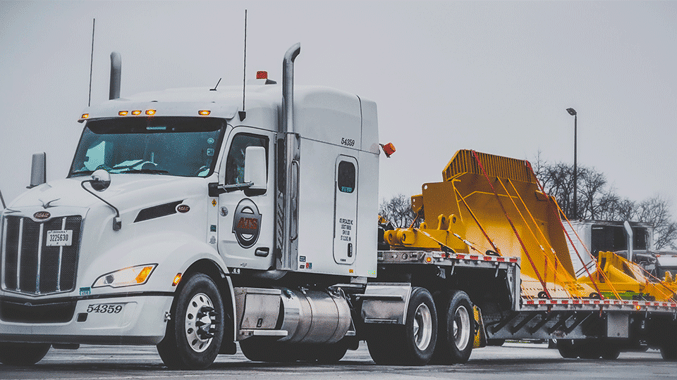
As you begin your job search, you’ll want to ensure that the position you choose checks all of your boxes. Maybe you want to find a role in an industry you're passionate about. Perhaps you value the freedom to be creative. Making an impact in the world might be your primary focus.
Whatever it is, failing to find it in a role can make it difficult to head to work day after day. Struggling to find a good fit has become all too common for job seekers across the globe.
With so many job options to choose from, it’s normal to feel overwhelmed and confused. Breaking your search down, industry by industry, is a great place to start your job hunt.
Here at Anderson Trucking Service (ATS), we’ve been a leading member of the transportation industry since 1955. During this time, we’ve hired countless job seekers and watched many of them thrive in the business of keeping supply chains running.
If you're considering a career in transportation logistics but you're unsure if it’s the right fit, you've come to the right place. Whether you’re drawn to the fast-paced world of logistics or exploring opportunities in sales, understanding the industry’s pros and cons is essential.
From job stability to the challenges of adapting to a dynamic environment, this article covers everything you need to know to make an informed decision. Let’s dive in and explore what a future in transportation logistics could look like for you.
- The cons of the transportation logistics industry
- Unpredictability
- Competitive
- Commission pay structure
- High turnover
- Challenging customer expectations
- The pros of the transportation logistics industry
- Good income
- High-demand industry
- Work-life balance
- Rewarding
- Exciting
- Ongoing training
What are the Disadvantages of a Career in Transportation?
The transportation industry is a great fit for many people, but there are disadvantages (as there are with every industry). The top disadvantages of working within logistics are:
- The transportation marketplace is unpredictable
- Transportation is competitive
- Some roles have a commission pay structure
- Higher-than-average turnover
- Meeting customer expectations can be challenging
#1: The Transportation Marketplace is Unpredictable
Transportation is ever-changing. Fuel prices shift, market rates change, rules and regulations fluctuate, and shortages, stoppages, and time crunches are commonplace.
For many, the unpredictability of the role is exciting and motivating — encouraging them to learn quickly and think on their feet.
Others face a different reality. Instead of leaning in and tackling this ever-changing industry head-on, it’s not uncommon for people — particularly those in customer-facing roles — to feel overwhelmed. If you prefer predictability in a job, you may want to look elsewhere.
Without proper planning, great training, and a finger on the pulse of the transportation market, stress can become a close companion of those in logistics jobs.
Accounting, human resources, finance, and other administrative roles are a bit more stable, but transportation’s ebbs and flows impact people in all positions.
#2: Transportation is Competitive
There are few businesses as competitive as transportation logistics. As an essential piece of every supply chain and business, selling transportation services is lucrative.
In the U.S. alone, there are a ton of different transportation providers (freight brokers, 3PLs, and trucking companies) each claiming to do their job better than the rest.

Gracing the list of “the best in the transportation business” is difficult — making it crucial that operations employees work hard, sales professionals overperform, and administrative workers stay on top of things.
Underperformance in any one position has the potential to topple the success of an entire department, division, and company. In such a competitive business, the success of the individual directly impacts the success of the larger corporation.
For this reason, should you decide transportation is the industry for you, be prepared to push yourself, to be held accountable for the duties you’re responsible for, and to work hard every day.
#3: Some Roles Have a Commission Pay Structure
Having a reliable, consistent paycheck is valuable for many people. Not to say this isn't available to you in the transportation world; many people (particularly those in administrative positions) are given a set hourly/salary compensation.
However, transportation’s volatility can sometimes impact commission-incentivized employees. With so many elements out of their control — supply, demand, fuel prices, truck and trailer maintenance costs, and insurance rates — it can be difficult for sales and operations employees to earn a predictable commission.

Even though the vast majority of transportation professionals earn a base salary on top of their sales commission, volatility often exists and should be noted.
If you’re a person who appreciates a solidified, dependable monthly income you may want to steer clear of these commissioned roles or select another industry entirely.
#4: Logistics Has Higher Than Average Turnover
While historically, industries like hospitality, retail, and food services boast turnover rates well above the average (ranging between 54-130 percent year-over-year) transportation is close behind them.
In an article published by Zippia — a premier resource for job seekers, loaded with collections of career-related statistics — the average turnover rate across industries in 2020 was 57.3 percent.
That same year, transportation’s turnover sat at 59 percent.
This rate of turnover, which can be attributed to the high learning curve and relatively low earnings offered by the first few months in commission-incentivized positions, may dissuade you from a career in this industry.
However, it should be noted that effective onboarding training sees these turnover rates decline. So, if you’re interested in the upsides of working in transportation, make sure to select a great company and ask them about their onboarding training program.
#5: Meeting Customer Expectations Can Be Challenging
At the end of the day, transporting freight is simply another expense that companies weather. So, as you might imagine, shippers are heavily price-driven. If they’re able to save some money by taking their business elsewhere, regardless of how many loads you’ve successfully moved for them, many businesses will do so.
For this reason, in the eyes of potential customers, many transportation professionals find it difficult to separate themselves from the price tags they boast. Although communicating the value of working with them over the competition, and the reasoning behind a higher price, can help here, this is a common challenge industry professionals face.
What Are The Advantages of a Career Transportation?
Now that you understand the potential downsides of working in the transportation industry, you may be left wondering, This seems tough, why in the world would anyone choose to work in transportation?
Good question. But trust us, there is a shiny flip side to working in the transportation industry.
The top advantages of starting a career in the transportation industry include:
- The potential to earn an above-average income
- Logistics is a fast-growing, high-demand industry
- Work-life balance is achievable
- Transportation is rewarding
- Every day in logistics is different
- Transportation professionals receive ongoing training
#1: The Potential to Earn an Above-Average Income
The U.S. transportation industry is one of the largest and highest-grossing industries in the country. Nearly $1 trillion of freight is moved around the nation every year.
With this much demand — a demand that can’t be ignored or serviced elsewhere — comes plenty of earning potential for great logistics companies.
In turn, profitable businesses — which in transportation earn more even in the most volatile of times — can trickle revenue down to their employees in the form of raises, bonuses, 401k matches, and heightened commission percentages.
These profits impact the yearly compensation of all employees across divisions and not just sales professionals alone. As such, if you’re looking for a job in accounting, information technology, or human resources you’ll likely find higher base pay ranges in the transportation industry.
#2: Logistics is a Fast-Growing, High-Demand Industry
As previously stated, the transportation industry is responsible for managing the movement of a massive quantity of cargo each year.
From food and beverage goods and manufacturing products to agriculture equipment and retail commodities, every single product used to keep America’s supply chains running falls under the logistics industry’s domain.
For the workers filling these roles, this demand translates to long-term job security — particularly for high performers.
If you value job security and want to work in an industry that will always be needed and impactful, give transportation a try.
#3: Work-Life Balance is Achievable
Many companies that move freight close up shop between 4 and 5 p.m. each day. As the party that arranges these transportation services, people in logistics sales/operations roles are typically able to follow suit — clocking in between 7 a.m. and 4 p.m. and rarely staying later.
Although some of these workers may need to remain “on-call” to communicate with drivers/shippers on occasion, in the vast majority of cases working in transportation allows for a good work-life balance.

For people in administrative roles at logistics companies, work-life balance is achieved as easily as it is in other industries.
At the end of the day, as long as you’re on top of your work, you should have no problem with work-life balance issues in the transportation business.
#4: Transportation is Rewarding
You’ll rarely feel like the work you’re doing is for naught in a transportation career. Without the transportation world’s assistance, stores would run out of products in a matter of days, inflation would quickly rise, and prices across the board would skyrocket.
Transportation industry professionals can rest easy each night knowing they truly made a difference. Because of the work logistics professionals do, refrigerators are full, store shelves are brimming, and local/national infrastructure is consistently improving.
Finding a rewarding career and making a consistent impact is one of the things job seekers prioritize in their search. Transportation is just another place for them to find it.
#5: Every Day in Logistics is Different
Look, a position in logistics will never be underwhelming, boring or stale. Every day presents a new challenge to solve. For this reason, transportation jobs attract a lot of attention from problem solvers in every walk of life.
Instead of sitting at a desk each day accomplishing mundane, repetitive tasks, most logistics roles ask employees to lean into new situations and think “outside of the box” throughout them.
Tight deadlines and difficult decisions will come fast and heavy in nearly every position available to logistics professionals. But don’t let this intimidate you. With the assistance of the team around you and experienced leadership, you’ll learn as you go and continually optimize processes over time.
#6: Transportation Professionals Receive Ongoing Training
This final advantage is sometimes undervalued. To keep up with the demanding pace of logistics — and the large pool of competitors they face — transportation companies are motivated to have the best employees possible in every role.
To do so, great companies make investments in each employee in the form of continued education and training. If you’re looking to expand your professional skillset and add to your arsenal of knowledge over time, transportation is a great industry to get into.

Not only will you learn the hard skills associated with your job — like the intricacies of freight pricing (for salespeople) — but you’ll also develop perseverance, problem-solving, and other soft skills that will benefit you for the rest of your professional journey.
Interested in a Career in Logistics?
With these pros and cons in mind, you probably have a good idea of whether pursuing a career in logistics is worth pursuing. This industry is full of unique opportunities for professional growth, personal earnings, and long-term success.
If you’re interested in giving this industry a go, you’ll find that one of your biggest opportunities will be to start out in a sales role. To give you insight into what you should expect from a logistics sales position, check out our article on The Pros and Cons of a Commission-Incentivized Sales Career in Transportation.
The article is full of information to help you set expectations for what a sales position would mean.
Also, here at ATS, we have a variety of openings — in sales and many other areas — in multiple locations across the U.S. We’d be happy to discuss how ATS can become your next career home.


